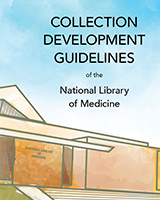NCBI Bookshelf. A service of the National Library of Medicine, National Institutes of Health.
Collection Development Guidelines of the National Library of Medicine [Internet]. Bethesda (MD): National Library of Medicine (US); 2019-.

Collection Development Guidelines of the National Library of Medicine [Internet].
Show detailsDefinition
The study of nutrition processes as well as the components of food, their actions, interaction, and balance in relation to health and disease (adapted from MeSH).
Discussion
The National Institutes of Health (NIH) funds a broad array of basic and applied research studies to further our understanding of nutrition as it relates to human health and disease. This includes research related to how nutrients and food components are ingested, digested, absorbed, metabolized, transported, stored, and excreted and the overall impact on the body as well as the study of the environment, psychology, and behavior associated with eating and how these factors play a role in nutritional status and in which foods people choose to consume.
In May 2020, the NIH released the 2020–2030 Strategic Plan for NIH Nutrition Research, to advance nutrition research across a wide range of areas, from basic science to experimental design to research training.
Scope and emphasis
NLM collects research and clinical literature on every aspect of human nutrition including normal nutrition (caloric and nutrient requirements throughout the life cycle and for specific populations), clinical nutrition (nutrition intervention aimed at the treatment or prevention of disease or illness), and nutritional epidemiology. NLM also collects titles on nutrition policy as a public health issue.
Because of the library's emphasis on biomedical research, NLM is particularly interested in works dealing with the physiology and biochemistry of nutrition. Works on nutrition as a health care profession are collected, as are works on nutrition education written primarily for those engaged in or preparing for careers in nutrition research, clinical nutrition, or nutrition in a health care setting. A limited number of instructional works written for general audiences or patients may be selected for their historical value, to chronicle public health outreach efforts, or to represent materials available to health providers for direct patient care. Such materials are collected very selectively with the emphasis on authoritative materials likely to be widely used in U.S. health care.
NLM collects more narrowly in food-related subject areas. The Library's primary interests are food composition, foodborne illness, and food toxicology. NLM also collects works that emphasize the public health aspects of food labeling and food inspection, rather than the management or techniques of dairy, meat, fish, or other food inspection programs. NLM collects works on dietary habits and customs when the content is directly related to biomedicine or health care; purely sociocultural works on food customs generally are not collected. NLM collects works on food service management in health care facilities, but not those on general food service management. NLM does not collect works on the food industry, food technology, food supply (including food consumption, food security and food economics), or home food preparation and handling.
Special considerations
The subject areas covered by this guideline overlap with the collecting priorities of the Library of Congress and the National Agricultural Library. For information on the Library of Congress collecting priorities, see Cooking, Nutrition and Food Technology.
The subject of animal nutrition is addressed in the NLM guideline on veterinary medicine.
- Human Nutrition - Collection Development Guidelines of the National Library of M...Human Nutrition - Collection Development Guidelines of the National Library of Medicine
Your browsing activity is empty.
Activity recording is turned off.
See more...